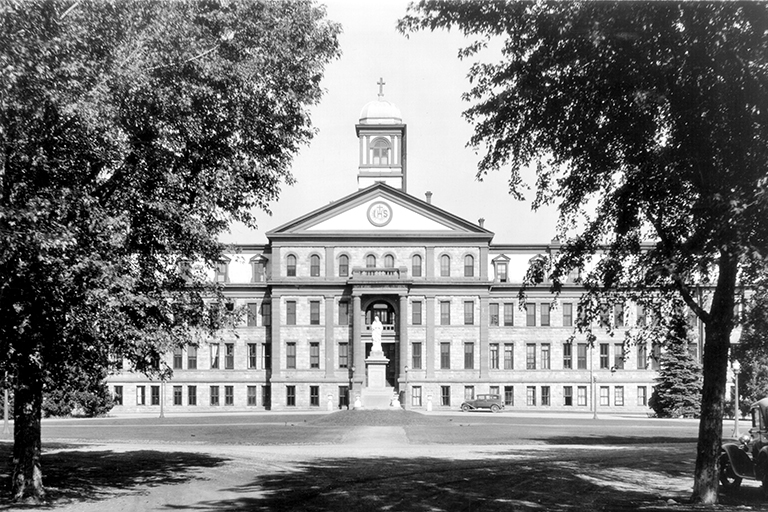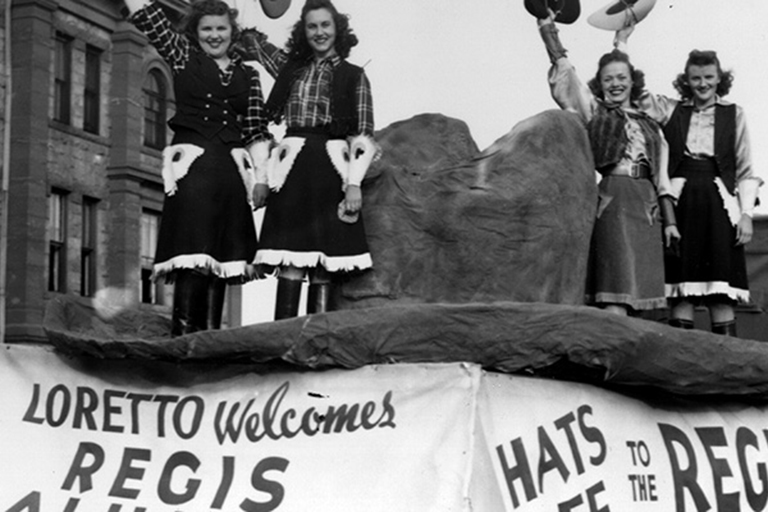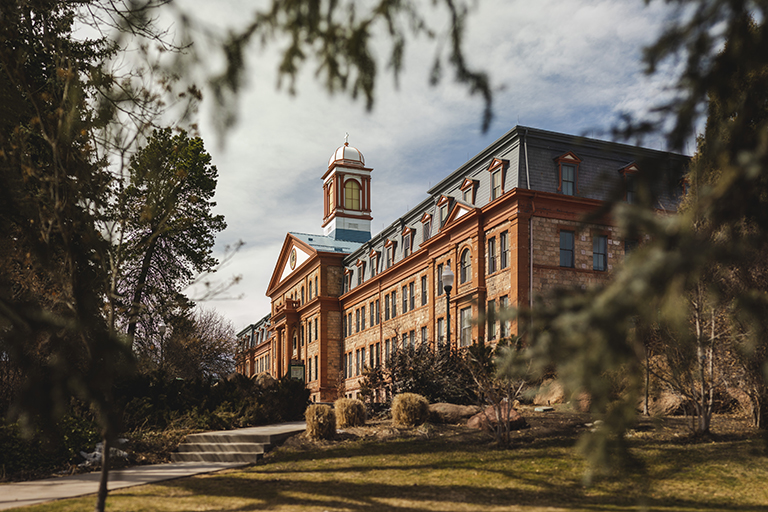Regis University Through the Ages
Founded in 1877, Colorado's Regis University is the only Jesuit, Catholic university in the Rocky Mountains and one of 27 Jesuit colleges and universities in the United States.
Inspired by St. Ignatius Loyola’s vision, Regis’ mission is to educate men and women of all ages and faiths to take leadership roles and to make a positive impact in a changing society. We encourage our students to seek truth, live purposeful lives and attempt to answer the question: "How ought we to live?"
College of the Sacred Heart to Regis College
Seven years after it was founded in New Mexico as Las Vegas College, Bishop Machebeuf invited our school to move to Morrison, Colorado, near Red Rocks. Renamed as the College of the Sacred Heart, it operated there for three years until a Jesuit-educated man, John Brisben Walker, gifted our establishment land in 1887. The Northwest Denver Campus still operates there today, with a clear westerly view of the Rocky Mountains and Flatirons.
We renamed ourselves Regis College 35 years later, honoring St. John Francis Regis, the patron saint of lace-workers. St. Regis was known for his service to at-risk women and youth, providing them stable incomes and independence. Originally a boy’s preparatory school, Regis continued to grow and became Colorado’s pioneer in adult education in the 1940s and later in online education in the 1990s.

Loretto Heights College to Regis University
At the heart of Regis University's Rueckert-Hartman College for Health Professions (RHCHP) lies Loretto Heights College (LHC). Founded in Denver, Colorado in 1891 by the Sisters of Loretto, LHC began as Loretto Heights Academy, a Catholic elementary and secondary school for girls.
In the summer of 1988, Loretto Heights College closed its doors 70 years after its founding in Denver by the Sisters of Loretto. Three of its academic programs moved to Regis College and provided the foundation for the Rueckert-Hartman College for Health Professions and the College for Professional Studies (now part of Regis College), ultimately allowing us to become Regis University in 1991.

Regis University Today
The Office of the President and our Board of Trustees provide guidance for a university now comprised of three colleges: Anderson College of Business and Computing, Regis College and the Rueckert-Hartman College for Health Professions.
Dedicated to providing a Jesuit education to men and women of all faiths and ages, Regis offers more than 130 academic programs online and at two campuses in the Denver metro area. Consistent with our beginnings, we continue to challenge our students to answer the same question: "How ought we to live?"

Regis University recognizes that Indigenous Peoples are the original stewards of the land we stand on today. We respectfully acknowledge that this land is the traditional homeland and buffalo hunting grounds of the Arapaho, Cheyenne and Ute Nations. We also recognize the 48 tribal nations that are historically tied to the lands that make up the state of Colorado.
As a Jesuit university, Regis is engaged in a mission of walking with those communities who have been excluded. Accordingly, it is important that we acknowledge that our presence on this land is due to the forced displacement of Indigenous Peoples from their ancestral lands. It is only in publicly recognizing this historical reality that we are able to embrace, in the present, our moral and intellectual responsibility and to affirm our commitment to a faith that does justice. In order to honor the original inhabitants of this land and to enter into right relationship with their descendants, Regis will continuously reimagine this acknowledgment, act on our responsibilities to the common good and respectfully collaborate with and support members of local Indigenous communities.
We also pause to acknowledge the labor upon which the prosperity of our country was built. We recognize that this nation has benefitted and profited from the labor of enslaved Africans as well as immigrant and refugee communities of color whose labor, whether voluntary, involuntary, trafficked, or forced, contributed to the building of this country and this state.
La Universidad de Regis reconoce que los pueblos indígenas son los administradores originales de la tierra en la que nos encontramos hoy. Reconocemos respetuosamente que esta tierra es la patria tradicional y fueron los terrenos de caza de bisontes de las naciones Arapaho, Cheyenne y Ute. También reconocemos a las 48 naciones tribales que están históricamente ligados a los territorios que constituyen el estado de Colorado.
Como universidad jesuita, Regis está comprometida en una misión de caminar junto a aquellas comunidades que han sido excluidas. En consecuencia, es importante que reconozcamos que nuestra presencia en esta tierra se debe al desplazamiento forzado de los Pueblos Indígenas de sus tierras ancestrales. Sólo al reconocer públicamente estas realidades históricas, podemos ser capaces de recibir y aceptar, en el presente, nuestra responsabilidad moral e intelectual, y afirmar nuestro compromiso con una fe que busca la justicia. Para poder honrar a los habitantes originales en estas tierras y para entrar en una relación adecuada con sus descendientes, Regis reimaginará continuamente estos reconocimientos, actuará de acuerdo a nuestra responsabilidad por el bien común, y se compromete a construir un entendimiento colectivo y fomentar conexiones auténticas con nuestras comunidades de color para lograr un cambio significativo.
También hacemos una pausa para reconocer el trabajo sobre lo cual se construyó la prosperidad de nuestro país.Reconocemos que esta nación se ha beneficiado del trabajo de los africano s esclavizados y de las comunidades inmigrantes y de refugiados de color cuyo trabajo, ya sea voluntario, involuntario, traficado o forzado, contribuyó a la construcción de este país y este estado.
